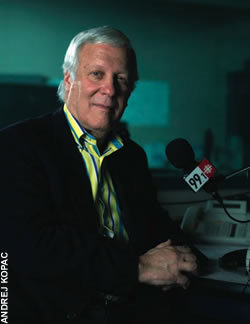Morning Glory
As commercial stations duked it out for ratings supremacy in the toughest market in the country, the unexpected occurred: a Toronto CBC program hosted by Andy Barrie climbed quietly to the top. How did that happen?

Metro Morning host Andy Barrie, the king of morning radio, in his CBC studio. Although the show has seen its best ratings with Barrie as host, he attributes the show’s success to the entire staff.
Andy Barrie pulls up in a taxi to the Front Street entrance of CBC’s downtown Toronto fortress at approximately 5:30 a.m. After settling the fare with his long-term driver, who jokes that Barrie has paid for at least 10 per cent of his mortgage, the king of morning radio grabs his copies of The Globe and Mail and Now, a Toronto alternative weekly. He shuffles toward the doors, letting a few flyers fall out of the papers. Then the soft-bellied man with pure white hair passes through the restricted-access interior gates. He takes the elevator up CBC’s tower to the third floor and heads to his desk. Amid family photographs, books, notes and a computer, there is a little black pillow with white lettering that reads, “Everyone is entitled to my opinion.” A large picture of Barrie as a young boy at Camp Skylemar in Naples, Maine, shows him wearing headphones, leaning over a microphone. As the camp’s radio host for “The Wake-up,” the nine-year-old played records, gave ball scores and led “camp chatter.” Barrie’s desk also boasts a plaque congratulating him for 10 years of “outstanding contribution to the success of Metro Morning.” These are not empty words of praise. He is the voice of the morning show ranked No. 1 in Canada’s largest city.
While Barrie flips through his morning papers, technician and associate producer Kim Holmgren is already in the control room. Sitting to his left is Gord Cochrane, a wiry, hunched-over man who rattles his knees incessantly. According to Barrie, Metro Morning’s studio director is one of the most valuable players on the “incredibly functional” morning team. The extent to which the show sounds fluid and relaxed, Barrie says, is largely due to Cochrane. The ever-smiling Jim Curran, who has reported on traffic since the show began in 1973, walks in not long after Barrie, carrying a cooler with milk for the crew’s coffee. Other team members, like producer Jessica Low, will trickle in later. At 6:12 a.m. Barrie sits comfortably in the studio with his headphones on, waiting for Judy Maddren to wrap up World Report. Then a red light above Barrie goes on to indicate ‘on-air’ and his voice unfurls like velvet over the airwaves with a leisurely morning greeting.
Across town and a few weeks later, in CFRB studios at the corner of Yonge and St. Clair, Ted Woloshyn entertains himself between on-air moments with cracks about a dating website he’s discovered. “We’ve lost him for the whole morning,” board operator Robert Turner says of Newstalk 1010’s morning show host. Meanwhile, producer Amy Allison chases a story about a Durham farmer who has been selling raw milk without a license and is on a hunger strike. She and Woloshyn disagree about what he and Globe columnist Christie Blatchford, a regular commentator, should discuss. When Blatchford comes on, Woloshyn goes ahead with his idea, ignoring his producer’s wishes. Allison rolls her eyes, huffing audibly. It’s near the end of November 2006, just a few weeks after Woloshyn celebrated his 10th anniversary as the show’s host. On December 15, he will unexpectedly resign, leaving management temporarily unsure of what to do with the show.
Two things are clear about Woloshyn’s departure: “It’s a major change for a major station,” says Brian Thomas, professor of radio news and media issues at Toronto’s Seneca College School of Communication Arts, and Barrie’s success will influence the new show’s direction. Woloshyn’s show was dry, in need of energy, Thomas says, and suggests that CFRB has been tuning in to Metro Morning. “All stations in town compete with each other in one form or another,” he says. “Barrie’s strengthening in the morning would affect CFRB — they’ll pay close attention to what he’s doing to get the ratings.”
So CFRB is fighting to reclaim a larger share of the morning audience with Woloshyn’s mic now in the hands of Bill Carroll. The station has flexed its marketing muscle for the new host with an ad campaign occupying almost 400 of Toronto’s billboards. None of this has anything to do with overtaking CBC though, says Carroll, because his listeners are “much busier, more active people” who would never listen to Barrie in the first place. After stints as co-host on MuchMusic, and news man on Q107 and then AM 640, Carroll joined CFRB as a weekend newscaster, then became news director, until 1999 when he started hosting his own late-morning show. Carroll’s hair and beard are the colour of fire and ash. The man is small but his personality is big and his opinions bigger. Industry veterans such as Jerry Chomyn, director broadcast media at Humber College’s School of Media Studies and Information Technology in Toronto, call Carroll an intelligent interviewer. “He has solid credentials as far as current affairs go,” he says. “His speed to be able to hear what the caller is actually saying and react is one of his strongest skills.” CFRB is using Carroll’s strengths with the hope that they will return the morning show to its glory days of a decade ago.
Perhaps, but back at the CBC building Barrie is safe in the belief that his audience is growing because people want more with their morning coffee than news-talk staples: a constant drumbeat of crime and highway carnage combined with open-line radio and aggressively opinionated hosts. “Private radio, and CFRB in particular, has gone seriously down-market,” says Barrie. “At one time it was an important current affairs station.” Former Metro Morning host David Schatzky goes even further: “Compared to CBC, CFRB is mindless drivel.”
Metro Morning shot to No. 1 in the Bureau of Broadcast Measurement Canada’s (BBM) ratings, surpassing private morning shows, for the first time in summer 2004. Now nearly a quarter of a million listeners tune in to CBC Radio One’s Toronto morning flagship. But those numbers didn’t happen overnight. A series of changes, beginning in 1995 when CBC hired Barrie away from CFRB, perceptively altered the show’s tone and content.
CBC Radio Toronto launched the first incarnation of its early morning show on April 2, 1973, with a mandate strikingly similar to what it is today. The open-door studio at 509 Parliament Street sat in a former 450-seat cinema, built in 1913. The show was originally called Tomorrow Is Here, a title host Bruce Rogers thought too “hokey” to say on air. A year later it was renamed Metro Morning. Rogers left that same year and four other hosts led the morning show before Barrie. The late Harry Brown lasted from 1974 to ’76, followed by Schatzky from ’76 to ’79. Joe Coté hopped aboard in 1979 and took the helm for 13 years. Finally, Matt Maychak played host from 1993 to ’95 — when Barrie took over — after leaving his long-time position as host of his namesake CFRB show.
Hosts have come and gone but there haven’t been many fundamental changes to programming or ideology since the early 1970s, says Alex Frame, who started at CBC Radio in 1971 and was vice-president from 1999 until 2003. “Probably the description you read in ’75 is the same one you read in 2006.”
The basic elements of Metro Morning remain: news, weather, traffic and a range of interviews. Reflecting on the original purpose of the show during Metro Morning’s 30th anniversary celebrations in 2003, initial host Rogers said, “The idea was to transform mornings across the CBC from DJ shows into programs reflecting their communities. In Toronto it would be multicultural and would make an effort to report on issues and events important to Toronto’s many neighbourhoods.”
But at the time, there were limits to how well the show could accomplish its goals. Schatzky says, “CBC hesitated to put someone on the air with an accent because they thought no one would understand them.” The show was trying, but not quite succeeding, to reflect the city’s diversity. This is where, in recent years,Metro Morning has truly shifted. “The sensibility of the program may have changed,” Frame says. “The consciousness changed.” Jim Carr, coordinator of the broadcast radio program at Seneca College and a habitual radio listener, picked up on the nuances Frame refers to. “I thought the show had changed, but I couldn’t put my finger on how,” he says. Now he’s better able to articulate the differences. “It sounds like you’re walking around in any one of the neighbourhoods downtown.” This was the effect Susan Marjetti, regional director of radio for Toronto, strove to create when she initiated Metro Morning’s revamp in spring 2001.
When CBC hired Marjetti, she immediately walked onto the floor, gathered up relevant staff and asked her “folks” if they thought Metro Morning reflected the fact that Toronto is the most multicultural city in Canada. The answer was a “resounding no.” Thus began a year of research in order to “move forward” and “become more relevant” to the city’s residents. Hosts, journalists, producers, as well as music and performance contributors met to discuss the gap between market research and what was actually being heard on the radio. The “transformation team” also brought in people from all walks of life and different communities to tell CBC about issues in their neighbourhoods. “I wanted to add music and performance under the same program values we’d choose for the news,” Marjetti says. They chose to “build a cast of characters around Andy,” regular columnists who host segments like “What’s Goin’ On,” or “Beyond Burgers,” bringing “new, diverse voices” and “fresh perspectives.”
The new voices make Metro Morning successful in “catering to a multicultural reality,” says Schatzky, although he’s less enthusiastic about how the changes have been accomplished journalistically. “Sometimes they do it through music and food, a softer approach,” he says. Schatzky laments, or perhaps nostalgically romanticizes, earlier days when the show had “harder hitting” content. “For the flagship current affairs morning show, it spends a lot of time telling people about new CDs and infotainment.” He wonders aloud whether taxpayer’s money should be spent on tips about consumer items, but acknowledges, “The ratings reflect that as a corporate strategy it has worked extremely well.”
For Metro Morning staff, the six columnists who have regular spots on the morning show are a part of how it better reflects Toronto’s diversity. Critics, on the other hand, might dub them leftovers from what Robert Fulford of the National Post calls “the year of trauma.” No one pointed out more scathingly how rough the show sounded during its makeover. In a 2002 Toronto Life, Gold National Magazine Award–winning column called “Mourning Show,” Fulford ripped apart the changes. “It sounded like Barrie was a guest on his own show,” he says. “It was so pitiful, so pathetic.” He explains, “People who grew up in Toronto and had pure Toronto accents, and poor Andy had to find a way to get them to say they weren’t white people.”
Frame defends the choices made as well as the challenges that ensued. “The move to be more contemporary is going to be rough for a while.” He says CBC’s ultimate job is to reflect the country back to itself. Toronto’s cultural make-up changed so radically over four decades — according to Statistics Canada, in 2001, 44 per cent of Toronto’s population was born outside of Canada — that Metro Morning had to change with it. The show moved “to tell the story from different perspectives, not just middle- class, white liberals,” he says. “Change and development is risky, but not changing is more risky. It would become irrelevant.”
Listening to the show now, Fulford says he doesn’t think many of the changes stuck and the show has reverted to the way it was before he wrote his cutting column. “The weird self-consciousness they developed about ethnicity is gone,” he says. But other than Priya Ramu, the senior producer who worked through much of the seven-month transformation process, and Natasha Ramsahai, a meteorologist Fulford called too “perky,” who moved on, Marjetti says the changes made between February and September 2002 have remained a part of the show and Metro Morning’s audience share has doubled as a direct consequence. “The track and path we’ve chosen has proven to be a good one,” she says. “Those changes actually catapulted the show to No. 1.”
Designed to help set advertising rates, BBM ratings play an even more significant role in the world of private radio. Pat Holiday, general manager of Standard Radio Toronto, which owns CFRB, says the 2006 fall ratings (the most important quarterly period) that placed Metro Morning at the top and CFRB in fifth place, don’t matter. He looks at trends, not specific periods. It’s hard to believe CFRB isn’t concerned about its morning show’s BBM position. The program used to be the No. 1 morning show back in fall 1995 and summer 1996, and even after that was well ahead of CBC, but its ratings have withered to the point where three music stations now stand between it and CBC.
James Cullingham, program coordinator in broadcast journalism at Seneca College, says the fact that CBC’s morning show is No. 1 “must just make the private stations mental.” He says he imagines they’re now looking at what CBC does successfully in order to move forward. Besides having the highest audience share in the 6 a.m. to 10 a.m., Monday through Friday, all-ages (12-years-old plus) category, what the ratings really say is that Metro Morning is winning the battle to stay relevant by giving the audience what it’s looking for. “People are starved for news content,” Cullingham says. “Despite what advertisers and private radio want us to believe, people are interested in a slower paced, more substantive morning show.” In addition, he says, CBC has “carefully tuned itself to a newer and rapidly changing audience.”
Seneca College journalism instructor Thomas, who attends a convention every year held by the Radio Television News Directors Association of Canada, as well as one in the U.S. held by the same group, says what invariably comes to the top of the agenda is that people want not only a fair, objective report of what’s happening, but more news. Unfortunately, not all news-talk stations have heeded the trend.
“The last few years, CFRB had its head in the sand about CBC,” says Seneca College’s Carr. He claims high-ranking people in private radio listen to CBC, even if they say they don’t. “It’s the dirty little secret in Toronto broadcasting. No one talks about counter programming with the CBC.” They may have been listening, but they failed to respond. Metro Morning is successful, Carr says, because “CBC has gone back to the roots of what radio is all about — local issues and stories.” Starting the morning show over with a new host gives CFRB the perfect opportunity to follow the public broadcaster’s example. Carr suspected the show would be “completely retooled.” Sure enough, it’s happening.
“What ’RB has done, if you listen carefully, they’ve reduced and repositioned the commercial load in the morning show,” says Humber’s Chomyn, who has worked in the broadcasting industry for more than 38 years. “The result is a nicer flowing show.” And there are other notable changes. Chomyn says, “We’re seeing a kinder, gentler side of Bill Carroll.” This is a big change for someone who has made a name for himself as an edgy, opinionated host. Lastly, Chomyn says, “You’ll notice there’s a team around Bill, it’s not just him.” The news anchors and other contributors constantly interact with Carroll on air. These transformations sound familiar.
Carroll goes on air at CFRB weekday mornings from 6 a.m. to 10 a.m. Right now it’s 8:30 a.m. and time to shift to the show’s open-line segment. Sitting in the studio in a high- backed leather chair on wheels, dressed in jeans and a button-up black shirt, he’s asking callers whether Toronto members of the Ontario Teachers’ Federation should be using union time to bring up Middle East issues. “The stronger my opinion is,” he declares, “the more reaction we get.”
Carroll pulls out his wallet, unprompted, to reveal a photo of his wife and two children. This is the new Bill Carroll, and perhaps why, according to Chomyn, he’s ready for the morning show, whereas a few years ago he wasn’t. Carroll is a family man now, more people can relate to him.
Eager to point out the show’s format changes, Carroll says there are “fewer regular features, fewer commercials, more opportunities for me to speak.” As for how his employer will handle the decrease in advertising revenue, he says, “The station makes less money, but in the long run you hope you’ll get more listeners and be able to charge more for the ads.”
Carroll has a specific strategy for gaining listeners. He says CFRB spent way too much time in the past competing against other news stations, so to recapture some of the lucrative morning audience he’s going after the people who tune into FM music stations. “I want John Derringer’s listeners, Erin Davis’s listeners.” The public broadcaster doesn’t come into Carroll’s crosshairs at all. “The CBC is too sleepy for me,” he says. “I don’t want to hear about Darfur, not for 20 minutes anyway. I’d rather know what’s going on in my backyard.” It’s a peculiar criticism directed at a show that owes its success to becoming more relevant and more local.
Apparently, CFRB’s ratings don’t concern the Metro Morning team either. Producer Jessica Low and her right-hand man, senior producer Nicholas Davis, who will be interviewed only in tandem, say it’s like comparing apples and oranges. “We’re CBC — we don’t have to cater to advertisers. Our mandate is to serve the public. We have two distinct operating principles,” they say over speakerphone, never interrupting each other’s answers. They attribute Metro Morning’s success not only to the way it reflects the audience it serves, but also to the way its stories have a strong impact on its audience.
Marjetti identifies another important factor that helped Metro Morning climb to “the top of the heap,” one CFRB won’t be replicating any time soon — CBC Toronto’s move from 740 AM to 99.1 FM in 1998. There is an obvious difference in sound quality between the AM and FM bands — the former sounds hollow, tinny and fuzzy, while the latter projects full and clear. But, according to Standard Radio’s Holiday, more than the improved sound quality it’s the increased number of people who tune in to the FM band. “If Metro Morningwasn’t on FM it wouldn’t be half the show it is because it wasn’t before it went to FM,” he says. “I’m not knocking the show — they still do a really good show.”
There is one last thing the Bill Carroll Show will never have, which is crucial to Metro Morning’s success: Andy Barrie. The show’s ratings have gone up with a host who even critics such as Fulford admit is “smooth” and “professional.”
The American-born Barrie studied theatre at Dartmouth College in Hanover, New Hampshire, hoping one day to be an actor. He volunteered at the student radio station, which quickly became his main outlet for performing. “You could actually get better and better,” he says. “Unlike an actor, where you might get a show every two years if you were lucky, you could be on every day.”
Although he was a conscientious objector, he was drafted into the U.S. Army during the Vietnam War. On orders to ship out, he deserted and came to Canada in 1969 — a past that surfaces on his show and contributes to his style. Now a Canadian citizen, he refers to himself on-air as an immigrant and is obsessively patriotic about his adopted country.
Still, CBC makes a mantra out of the cliché, “a station is more than the sum of its parts,” in a way that private stations don’t, which places limits on Barrie’s voice. “There are judgments I’ve made about what we ought to do on the show — everything from what kind of music we ought to play to who we ought to interview — that aren’t shared.”
But he plays ball with the team format, and attributes the show’s continued success to the entire staff, not just him. “I cannot claim, as I once could when I did my own program, that what you hear on that show belongs to me,” he says. “This isn’t The Andy Barrie Show, and I’m thrilled it’s not.”
Just after 8:30 a.m. Barrie signs off Metro Morning for the day. Following the requisite story meeting, he heads down to the ooh la la! café in the main atrium. He orders a BLT and a fruit salad. “My first love was puppetry,” he says, eating pieces of watermelon and berries with his fingers while still in line. He admits he thrives on having an audience. On Metro Morning, CBC is master puppeteer, the airwaves the strings and Barrie’s voice the puppet. They perform a show about a diverse city called Toronto for a very pleased audience. “There’s something wonderfully powerful,” he says, “about projecting yourself into a world where you can’t be seen.”
by Lisa Paul
Lisa Paul was the Chief Copy Editor for the Spring 2007 issue of the Ryerson Review of Journalism.














































